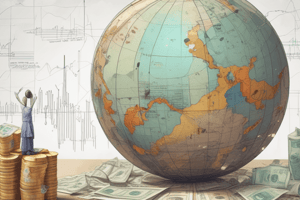Podcast
Questions and Answers
What is the definition of economic value?
What is the definition of economic value?
- The total cost of acquiring an asset
- The estimated profit from an asset over its lifespan
- The average market price of an asset over time
- The maximum dollar price that one is willing to pay for an economic asset (correct)
Which of the following is not a synonym for opportunity cost?
Which of the following is not a synonym for opportunity cost?
- Required rate of return
- Hurdle rate
- Discount rate
- Future value (correct)
What principle states that a dollar today is worth more than a dollar tomorrow?
What principle states that a dollar today is worth more than a dollar tomorrow?
- Discounting principle
- Investment principle
- Time value of money (correct)
- Opportunity cost principle
What is the main function of interest rates in economic decision-making?
What is the main function of interest rates in economic decision-making?
How is present value determined?
How is present value determined?
Which statement best defines cash in the context of economic value?
Which statement best defines cash in the context of economic value?
Which of the following is an example of creating wealth through economic assets?
Which of the following is an example of creating wealth through economic assets?
What role does opportunity cost play in economic decision-making?
What role does opportunity cost play in economic decision-making?
What does economic value primarily focus on?
What does economic value primarily focus on?
Which of the following statements is true regarding the Internal Rate of Return (IRR)?
Which of the following statements is true regarding the Internal Rate of Return (IRR)?
In what scenario would an investment be considered 'underpriced'?
In what scenario would an investment be considered 'underpriced'?
What is one of the four essential elements of economic value?
What is one of the four essential elements of economic value?
Which condition is necessary for using Net Present Value (NPV) to assess an investment?
Which condition is necessary for using Net Present Value (NPV) to assess an investment?
What situation exemplifies an opportunity cost?
What situation exemplifies an opportunity cost?
What does a positive Net Present Value (NPV) indicate?
What does a positive Net Present Value (NPV) indicate?
Which statement accurately describes the relationship between risk and future cash flows?
Which statement accurately describes the relationship between risk and future cash flows?
What factor must be compared to the IRR to assess the attractiveness of an investment?
What factor must be compared to the IRR to assess the attractiveness of an investment?
What does a positive Net Present Value (NPV) indicate about an investment?
What does a positive Net Present Value (NPV) indicate about an investment?
Which of the following correctly defines risk in finance?
Which of the following correctly defines risk in finance?
What components make up the opportunity cost for most investments?
What components make up the opportunity cost for most investments?
The expected return refers to which of the following?
The expected return refers to which of the following?
What happens when future cash flows are highly uncertain?
What happens when future cash flows are highly uncertain?
Which statement correctly describes the risk-free rate of return?
Which statement correctly describes the risk-free rate of return?
What is the purpose of the risk premium in investment calculations?
What is the purpose of the risk premium in investment calculations?
What is defined as the extra return above the risk-free rate required due to uncertain future cash flows?
What is defined as the extra return above the risk-free rate required due to uncertain future cash flows?
Which component is NOT part of the opportunity cost?
Which component is NOT part of the opportunity cost?
How does increased risk affect present value calculations of future cash flows?
How does increased risk affect present value calculations of future cash flows?
Economic value is best defined as:
Economic value is best defined as:
Which statement about opportunity cost is incorrect?
Which statement about opportunity cost is incorrect?
Positional goods derive their value mainly from:
Positional goods derive their value mainly from:
What happens when the price paid for an economic asset is less than its economic value?
What happens when the price paid for an economic asset is less than its economic value?
Which of the following terms is commonly used synonymously with opportunity cost?
Which of the following terms is commonly used synonymously with opportunity cost?
What is the realized return?
What is the realized return?
What does the risk-free rate of return represent?
What does the risk-free rate of return represent?
Which of the following variables affects the future value of an investment?
Which of the following variables affects the future value of an investment?
In the context of investments, what is a risk premium?
In the context of investments, what is a risk premium?
How does compound interest differ from simple interest?
How does compound interest differ from simple interest?
What is the relationship between present value and interest rate?
What is the relationship between present value and interest rate?
Which aspect does not influence the future value calculation?
Which aspect does not influence the future value calculation?
What role does monetary policy play in investments?
What role does monetary policy play in investments?
Flashcards are hidden until you start studying
Study Notes
Economic Value: Calculating Economic Value
- Economic assets are entities that hold value and are legally owned. They generate economic benefits for their owners.
- Economic value is the highest price someone is willing to pay for an asset. It's calculated by finding the present value of future cash flows, discounted by the opportunity cost.
- Opportunity cost is what you give up by choosing one option over another. It's often expressed as a rate of return, representing the potential earnings from alternative investments.
- Cash is a crucial element of economic value, acting as a medium of exchange and a way to settle obligations.
- The First Principle of Finance states that a dollar today is worth more than a dollar tomorrow. This is due to the time value of money, where the value of money decreases over time.
- Interest rates represent the cost of borrowing or the return on lending. They bridge the gap between consumption and investment, allowing market participants to use excess capital or acquire funds.
- Compounding calculates the future value of an investment by adding earned interest to the principal, allowing the value to grow exponentially.
- Discounting calculates the present value of a future cash flow by factoring in the time value of money and the opportunity cost.
Making Wealth-Increasing Decisions
- Wealth is the control over economic assets.
- Wealth increase happens when an asset is acquired at a price lower than its opportunity cost, effectively securing a bargain.
- Internal Rate of Return (IRR) is a percentage measuring the return earned on an investment. It's used to compare the project's return against the opportunity cost.
- If the IRR is greater than the opportunity cost, the investment is underpriced, leading to wealth increase.
- If the IRR is less than the opportunity cost, the investment is overpriced, leading to wealth loss.
- Net Present Value (NPV) measures the dollar change in wealth resulting from an investment. It considers cash flows, time value, and opportunity cost.
- A positive NPV indicates an increase in wealth and a desirable investment.
- A negative NPV indicates a decrease in wealth and an undesirable investment.
Adjusting Economic Decisions for Risk
- Expected return is the anticipated return based on available information.
- Realized return is the actual return obtained after the investment period.
- Uncertainty is the possibility that realized return may deviate from expected return, leading to a difference in outcomes.
- Risk is quantifiable uncertainty, often measured by the potential for the realized return to differ from the expected return.
- Opportunity cost for risky investments consists of two elements:
- Risk-free rate of return: The return earned on an asset with no risk.
- Risk premium: A premium added to the risk-free rate to compensate for uncertainty.
- Investors adjust the price they're willing to pay for an asset based on the perceived risk and required risk-adjusted opportunity cost.
Key Concepts: Risk and Economic Value
- Risk in Finance is defined as receiving a lower return than expected.
- Expected return is the future return, often uncertain, anticipated from an investment.
- Realized return is the actual return received at the end of the investment period.
- Risk-free rate of return is the return earned on an asset with certain future cash flows.
- Risk premium is the additional return required to compensate for the uncertainty associated with the future cash flows of an investment.
### Economic Value: Applying Time Value Techniques: Single Cash Flows in Multiple Periods
- Future Value is directly proportional to the interest rate. A higher interest rate leads to a higher future value and vice-versa.
- Monetary Policy is the actions taken by central banks to influence economic conditions, such as price stability and employment.
- Present Value is inversely proportional to the interest rate.
Studying That Suits You
Use AI to generate personalized quizzes and flashcards to suit your learning preferences.




